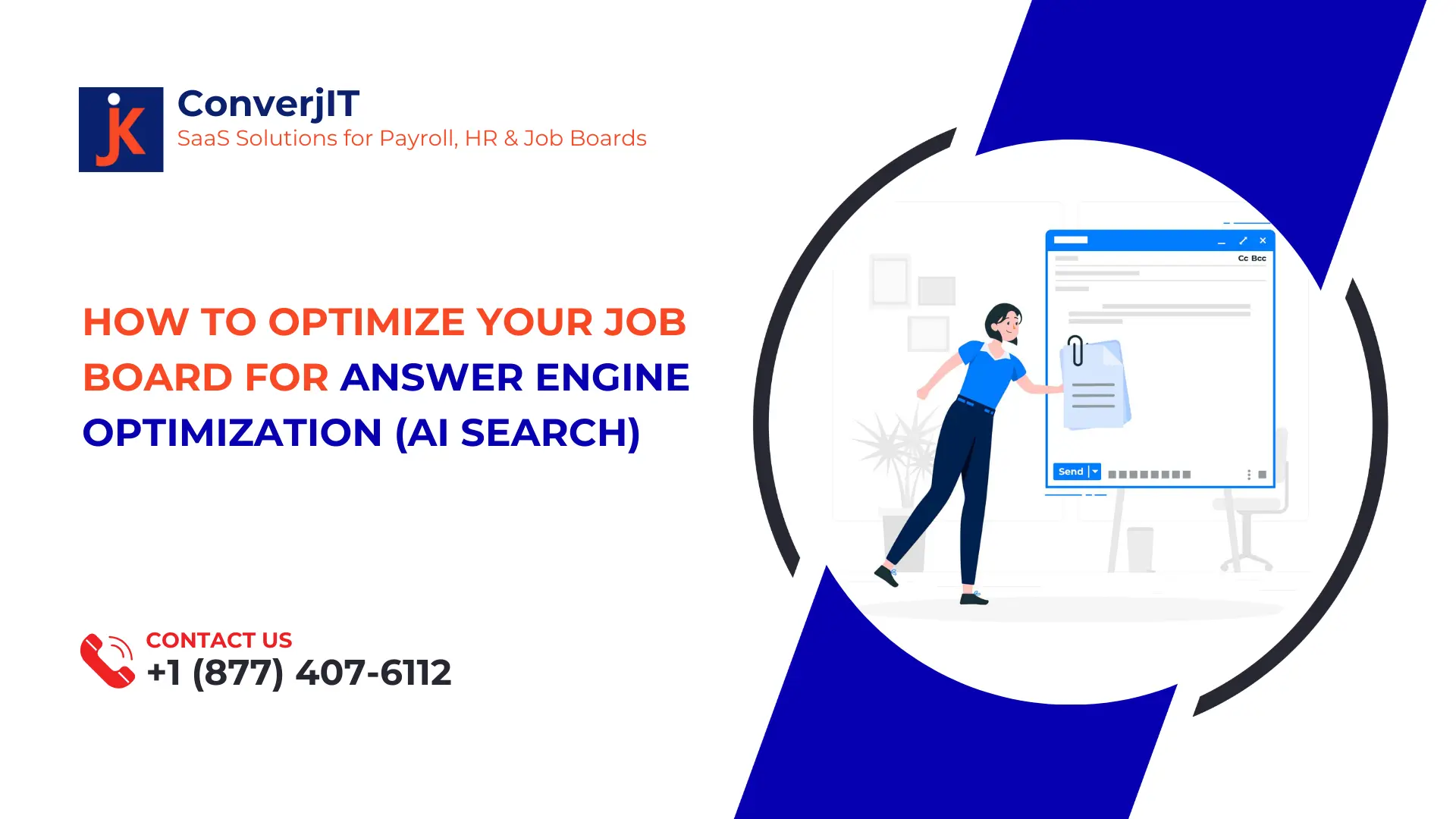In today’s fragmented job market, niche job boards are carving out valuable space by catering to specialized industries, professions, and geographies. These platforms thrive by offering hyper-relevant job listings to a targeted audience. However, their success hinges on one core asset: high-quality job listings. In today’s contracting job market, sourcing enough relevant, up-to-date listings is one of the most significant operational challenges they face. This is where job scraping comes into play.
Job scraping automates the collection of job listings from employer websites, applicant tracking systems (ATS), and job aggregators. When implemented strategically, it provides a strong return on investment (ROI) for niche job boards by streamlining job acquisition, driving user engagement(i.e. resumes), and enhancing platform value.
Understanding the Economics of a Niche Job Board
Niche job boards often operate under monetization models such as employer job listings, subscriptions, and ad revenue. Regardless of the model, success depends on attracting and retaining job seekers. The more relevant listings a platform offers, the more likely it is to rank well in search engines, drive traffic, and increase conversions.
As niche job boards mature, they often face a different kind of growth plateau—not from a lack of users, but from declining engagement or value per employer. A noticeable drop in the ratio of job postings to employer accounts or a decrease in average customer spend can signal that your current job acquisition model isn’t scaling effectively.
This is where introducing new bulk job posting options, powered by job scraping, becomes a strategic solution. By automatically populating relevant listings, you can enhance the perceived value of your platform, re-engage employers, and offer tiered or volume-based pricing models that drive additional revenue without requiring more manual input.
What is Job Scraping and How Does It Work?
Job scraping refers to the automated process of extracting job postings from various online sources. It involves:
- Crawling: Visiting targeted web pages to locate job content
- Capturing: Once found, job content is extracted from the website
- Parsing: Structuring and extracting data such as job titles, descriptions, locations, and application URLs
- Filtering: Ensuring the listings are relevant to your niche
Common sources include company career pages, third-party job boards, and ATS platforms. While effective, scraping must respect ethical and legal boundaries such as website terms of service, robots.txt files, and attribution requirements.
Manual Posting vs. Job Scraping
Manual job posting requires either employers to list jobs themselves or internal teams to source and input listings. This process is slow, costly, and difficult to scale.
In contrast, job scraping automates the process, enabling a job board to ingest hundreds or thousands of listings per day. For example:
- Manual team: ~100 listings/day with 2 staff
- Automated scraper: ~10,000 listings/day with minimal oversight
The scalability and cost-efficiency of scraping quickly surpass manual methods, especially for boards aiming to grow fast.
Evaluate your job sourcing strategy and consider how job scraping can accelerate your growth. Contact our team for a scraping strategy session or try our ROI calculator to estimate your potential gains.
Learn about Job Board ScrapingROI Breakdown of Job Scraping
Implementing job scraping delivers a measurable return on investment across multiple dimensions. Here’s a detailed look at how scraping enhances the performance and profitability of niche job boards:
1. Traffic Growth: More Listings = More Organic Visibility
Search engine optimization (SEO) is a major traffic driver for job boards, and job volume directly influences your search engine presence. Scraping allows you to quickly scale the number of job listings on your site, which:
- Increases indexed pages: Each scraped job creates a unique page that search engines can index, expanding your content footprint.
- Boosts long-tail keyword coverage: Every job title, skill requirement, and location adds to your keyword diversity, helping you rank for thousands of job-specific queries.
- Improves content freshness: Search engines favour regularly updated websites. Fresh job data signals to Google that your site is active and valuable.
For example, increasing listings from 1,000 to 10,000 can 10x your indexed URLs, potentially multiplying organic impressions and clicks—without additional ad spend.
2. Conversion Rates: More Relevant Jobs, More Engaged Users
Job seekers don’t just want volume—they want relevance. Scraping allows you to target and filter job sources that align with your niche, ensuring that listings closely match your audience’s interests.
- Higher engagement: Users are more likely to browse, click, and apply when listings are current and tailored to their needs/niche focus.
- Increased registrations: A rich catalog of jobs incentivizes users to sign up for alerts, upload resumes, or create accounts.
- Improved return visits: Consistently fresh and relevant job data builds trust and drives repeat traffic.
This boosts your lead generation metrics, email subscriber base, and even direct employer inquiries over time.
3. Time & Cost Savings: Lower Operating Costs Through Automation
Manual job curation involves hours of research, data entry, quality checking, and formatting—either in-house or outsourced. This process is inefficient and expensive.
Job scraping reduces this burden drastically by:
- Automating collection: Once set up, scrapers run on a schedule, pulling and formatting data with minimal intervention.
- Eliminating human error: Parsing and deduplication routines maintain cleaner, more consistent data.
- Freeing up human resources: Your team can focus on value-added tasks like community management, UX optimization, and employer relationships.
Over time, this translates to substantial cost savings. For instance, replacing two content moderators (at $3,000/month ea.) with a comprehensive scraping service (at $1,000/month for more than 25 sites) saves $4,000 monthly while scaling content production.
4. Speed to Market: Fast Content = Faster Growth
In the competitive job board space, the ability to populate your platform quickly can make or break your launch or growth phase.
Scraping enables:
- Rapid inventory growth: You can go from zero to thousands of listings in days or weeks, not months.
- Timely listings: Automated scraping can capture newly posted jobs before they appear on competitors’ sites.
- Close Sales Faster: Employers may be ready to advertise on your site but not have time to manually post or take weeks to find their outbound feed settings. A top tier solution will have your scrape up in 2 days or less.
This speed gives new job boards a fighting chance to gain traction early, before relying on inbound employer listings or word-of-mouth.
Best Practices for Effective Job Scraping
- Source Quality: Choose reputable, niche-relevant sources
- Freshness: Regularly update and remove expired listings
- Deduplication: Avoid multiple copies of the same job
- Filters: Use tags and categories to keep content relevant
- Monitoring: Set up alerts to detect scraping issues or source changes
Challenges and Limitations
- Anti-bot Measures: Captchas, IP blocks, and rate limits can obstruct scraping
- Legal Risks: Scraping some sites without permission may lead to legal exposure
- Content Quality: Poorly scraped data can hurt user trust
Conclusion
Job scraping offers a high-ROI pathway for niche job boards to grow listings, traffic, and revenue without incurring prohibitive operational costs. By automating job acquisition, niche boards can focus on building community, enhancing UX, and converting users. However, successful implementation requires strategic planning, technical expertise, and quality control.





